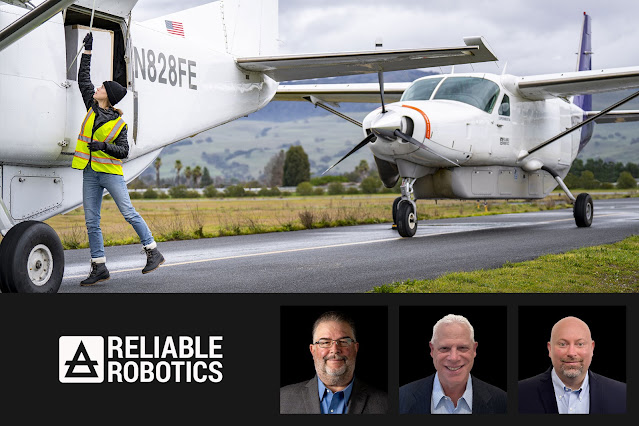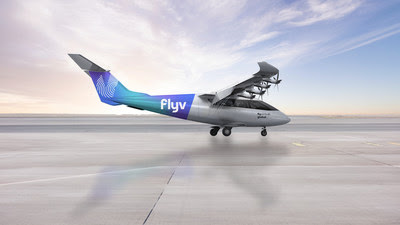Electra and flyv to Reinvent Regional Air Travel in Europe with On-Demand Flights on Hybrid-Electric eSTOL Planes
Electra Adds 100 New Aircraft Orders for Affordable Air Mobility Service in Underserved Mid-Range Markets
A new generation of cost-efficient hybrid-electric aircraft is making on-demand regional air travel commercially feasible. Electra.aero, a US-based clean aviation technology company and flyv, a German company creating On Demand Air Mobility solutions, have partnered to develop a revolutionary customer-centric air mobility solution that leverages the economic advantages of Electra's sustainable flight technology to offer travelers the quickest, most cost-effective route between locations in underserved regional travel markets in Europe.
Passengers will fly on Electra's hybrid-electric, ultra-short takeoff and landing (eSTOL)aircraft, a fixed-wing plane that uses a unique combination of proven blown lift technology, hybrid-electric power, and distributed propulsion to operate on runways as small as 100x300 feet. The quiet, piloted plane delivers substantially lower emissions and operating costs than conventional aircraft. Batteries are recharged mid-flight, eliminating the need for ground charging infrastructure and enabling quick flight turnaround in diverse environments. The flyv service will initially operate between airports and eventually provide point-to-point intercity travel, taking full advantage of the Electra eSTOL's ability to take off and land in places previously inaccessible by flight.
flyv is a novel airline focused on regional air mobility. In lieu of a traditional hub and spoke network, the flyv scheduling platform uses a proprietary algorithm to optimize the daily flight schedule based on paid bookings and operational constraints. flyv will provide customers a guaranteed fixed travel timeframe to their destination at the point of booking, and exact itinerary details prior to departure.
"There is a gap in transportation services today between where ground transport is effective and where large transport aircraft are providing efficient service. We designed Electra's eSTOL aircraft to fill that gap, providing a more sustainable transport option than cars or traditional aircraft for short and medium distance routes up to about 500 miles," said John S. Langford, Founder and Chief Operating Officer (CEO) of Electra.aero. "We are delighted to be partnering with flyv to pair our aircraft technology with flyv's innovative business model and flight scheduling technology to bring this transportation solution to customers."
"Traditional airlines are focused on capacity, not on demand. We're building a new means of transport that is demand-driven and customer centric. We aim to connect unserved communities to as many other decentralized locations as possible by delivering the fastest means of transport from one point to another at market value-based prices," explained flyv Chief Executive Officer (CEO) Anton Lutz. "The economics were a challenge with conventional aircraft. The cost-effectiveness of Electra's high-performance eSTOL aircraft is the puzzle piece that makes the flyv model work. Our partnership with Electra enables a micro-mobility solution that connects the unconnected into the global aviation network in a sustainable way, creating economic opportunities for both communities and customers," said Lutz.
Under a Memorandum of Understanding (MOU), flyv will be Electra's air mobility services partner in Europe, and Electra will be flyv's OEM partner for regional air mobility services in Europe and elsewhere, with a commitment by flyv to purchase of up to 100 Electra eSTOL aircraft. The agreement raises Electra's total purchase commitments to 280 aircraft. The two companies will jointly explore urban and regional networks to be served by flyv, and will collaborate on elements of eSTOL performance, economics, and passenger experience as well as joint marketing initiatives. The global urban and regional advanced air mobility market is forecast by Morgan Stanley at $1 trillion.
About flyv
flyv is a start-up On-Demand Air Mobility airline connecting people in a demand-driven network, with a mission to connect every possible landing field in a single customer-induced web created anew every day. The company's core asset is its two algorithms: the fulfillment algorithm and the product algorithm. Together they enable optimized product offering and operationalization leading to a new approach in airline distribution and management. flyv's highly skilled team draws from various disciplines with executive experience from Amazon, GE Aviation, Vodafone, easyJet, and Lufthansa Group, as well as renowned scientific institutions and European airports.
About Electra.aero
Electra.aero, Inc. is a next-gen aerospace company leading the way in sustainable urban and regional mobility. The company is building clean, hybrid-electric, ultra-short takeoff and landing (eSTOL) airplanes that fly people and cargo quieter, further, and more affordably. Electra is collaborating with air transport and ground infrastructure operators to achieve a turnkey solution for diverse markets. Electra's team includes some of the most respected and successful entrepreneurs and engineers in novel aircraft design, and its technology development is supported by NASA and the US Air Force Agility Prime program.
More top stories you might be interested in.....
Follow this site here.





























